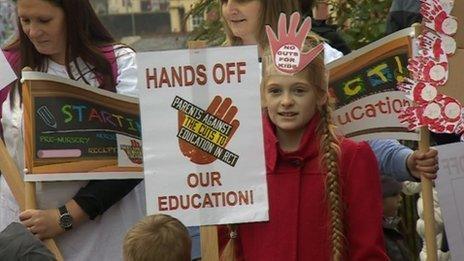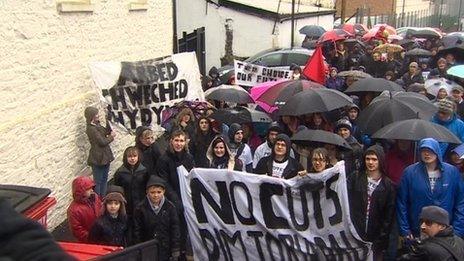Wales councils: Pressure on services and tax bills
- Published

Children in Rhondda Cynon Taf would not start nursery school until they are four under the plans
The closure of Rhydfelin library is causing anger in the village. It's one of 14 out of 26 libraries in Rhondda Cynon Taf due to shut - just one of the ways the local council is trying to save money.
There are threats of legal challenges to stop the closure of Rhydfelin library and of changes to nursery services in the county borough.
But some local people I talk to are more sympathetic to the council.
The closures are part of a plan to save £70m over four years.
And more cuts - to leisure and cultural services - are needed to balance the books.
The council calls it Armageddon.
No other councils have used such colourful language to describe their predicament. But there's nothing unique about a story of a local authority facing deep cuts to its budget.
When a new financial year starts next month you might see the strain reflected in your council tax bill.
On average, council tax will rise £42 year.
The 22 local authorities are putting up their council tax rates by an average of 4.2%.
Swansea, Conwy and Ceredigion councils will impose 5% increases - the maximum the Welsh government will allow.
Bridgend (4.98%) and Powys (4.95%) councils are within a whisker of doing the same.
The 4.2% rise is steeper than last year, and steeper than the rest of Britain says Welsh Conservative shadow local government minister, Mark Isherwood.
"By the end of February 231 councils in England had already signed up to the council tax freeze in England," he says.
"The Scottish government has announced its seventh year of council tax freezes and yet Wales is being clobbered yet again."
Even with these rises, bills are significantly lower in Wales than in England - £230 lower for a band D home, says Local Government Minister Lesley Griffiths.
'Unreasonable'
She says she's keeping her eye on council tax rates and will cap them if councils are unreasonable.
"I didn't give them a figure because I felt if I gave them a figure then they all might think that was the figure they could start at," she says.
"What I've said is that if any are unreasonable I will use my capping powers and at the moment I'm analysing all the increases that are coming in."
Austerity in public spending isn't new. So why are councils looking for bigger cuts to services - and bigger hikes to taxes - this year?

Ysgol Gyfun Rhydywaun pupils and others protest against proposed Merthyr council service cuts
The Welsh government's budget has been cut in Westminster, but this year it's passing on a bigger share of the cuts to county halls.
It's thanks to a decision in Cardiff Bay to protect funding for the NHS in the next financial year.
David Phillips, from the Institute for Fiscal Studies, says: "The NHS is a very big part of the Welsh government's budget - 40%.
"So if you protect that one area that means much bigger cuts elsewhere. That pressure will build over time if the Welsh government decides to extend that protection beyond the two years it's indicated so far."
The Welsh Local Government Association says its members have come through an "extremely difficult round of budget setting".
The tax hikes are a response to a budget shortfall of £290m in 2014/15, it says.
Councils don't have much room for manoeuvre thanks to another Welsh government decision - no cuts to schools and social services.
A recent Wales Audit Office report found cash-strapped councils have struggled to cope so far, with many unclear about how they will get by with less.
To make matters worse, we're putting more pressure on our councils.
The same audit office report talks about something called the "Barnet Graph of Doom" - a projection from the London Borough of Barnet that says social care could end up consuming almost all of a council's resources.
A Doomsday scenario? Perhaps Rhondda Cynon Taf's warning of Armageddon won't prove to be quite so unique after all.